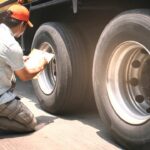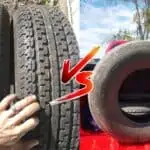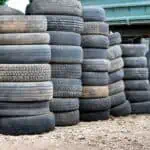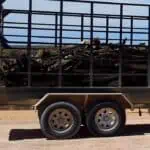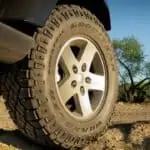There are a few key differences between 14 ply and 16 ply tires. For starters, 16 ply tires have thicker sidewalls than 14 ply tires. This means that they can handle more weight and are less likely to puncture.
They also have a higher load rating, which means they can carry more weight without sacrificing performance or durability. Finally, 16 ply tires typically have better traction than 14 ply tires, making them ideal for off-road driving or hauling heavy loads.
There is a big debate in the trucking world about which is better 14 ply or 16 ply tires. There are pros and cons to both sides, so it really depends on what you are looking for in a tire. Here is a breakdown of the two types of tires to help you make a decision.
14 Ply Tires:
-Tend to be more affordable than 16 ply tires
-Better fuel economy due to their lighter weight
-Easier to maneuver since they are not as heavy
16 Ply Tires:
HOW TO STOP TRAILER TIRE BLOWOUTS…..*LONG LASTING TIRES*.
Are 14 Ply Tires Better Than 16 Ply?
There is no definitive answer when it comes to choosing between 14 ply and 16 ply tires. Ultimately, the decision depends on a number of factors, including the type of vehicle you are driving, how you use your vehicle and your personal preferences. Here is a closer look at some of the key considerations to help you make the best decision for your needs.
One of the main differences between 14 ply and 16 ply tires is the amount of weight they can support. If you regularly carry heavy loads or drive in off-road conditions, then 16 ply tires may be the better option as they can handle more weight without suffering from excessive wear and tear. However, if you don’t typically carry heavy loads or drive in demanding conditions, then 14 ply tires should be sufficient.
Another thing to keep in mind is that 16 ply tires tend to be more expensive than 14 ply options. If cost is a major consideration for you, then 14 ply tires may be the way to go. However, it’s important to remember that cheaper doesn’t always mean better – so make sure to do your research before making a final decision.
At the end of the day, choosing between 14 ply and 16ply tires comes down to personal preference and what works best for your needs. If you’re unsure which option would be best for you, consult with a professional or ask someone who knows about tire types and grades before making your purchase.
Are 14 Ply Tires Worth It?
Fourteen ply tires are not necessarily “worth it.” The number of plies does not indicate the quality of the tire. In fact, a 14 ply tire may be less durable than a 10 ply tire because the extra plies make the tire stiffer and more difficult to flex.
This can lead to cracking and other problems.
What Load Range is a 16 Ply Tire?
When shopping for tires, you’ll often see a number like “16 ply” or “10 ply.” But what do these numbers mean? They’re actually referring to the tire’s load range, which is an indication of how much weight the tire can support.
A 16 ply tire can support up to 3,750 pounds at 45 psi (pounds per square inch). This is generally considered to be a heavy-duty tire that’s well-suited for hauling or towing. If you need even more weight capacity, you can look for an 18 ply tire, which can support up to 4,000 pounds.
Is the Higher the Ply Tire Better?
It’s a common misconception that the higher the ply tire, the better it is. This is simply not true. The ply rating of a tire has nothing to do with its quality or performance.
Rather, it is a measure of the tire’s strength and durability. A higher ply rating simply means that the tire can withstand more weight and abuse before failing.
Instead, focus on other factors such as brand reputation, customer reviews, and expert recommendations.

Credit: tirehungry.com
16 Ply Tire Load Range
Tires are an important part of any vehicle, and the load range is one of the most important things to consider when choosing tires. The load range is the maximum weight that a tire can support safely. A 16 ply tire has a higher load range than a 14 ply tire, meaning it can support more weight.
This makes 16 ply tires ideal for heavy duty vehicles such as trucks and buses.
16 Ply Vs 18 Ply
When it comes to tires, there are a lot of numbers and terms that can be confusing for consumers. Two of the most common terms you’ll see are “16 ply” and “18 ply.” But what do these numbers mean?
And more importantly, which one is right for your vehicle?
In short, ply refers to the number of layers of tire cord in the tire. The higher the number, the more layers there are and the tougher the tire is.
That’s why 16 ply tires are typically used on trucks and other heavy duty vehicles while 18 ply tires are usually found on commercial trucks.
So if you’re trying to decide between 16 ply and 18 ply tires, it really comes down to what you’ll be using them for. If you need a tough tire that can handle a lot of weight and wear-and-tear, then go with 16 ply.
But if you need an even tougher tire for things like off-roading or hauling heavy loads, then 18 ply is probably your best bet.
12 Ply Vs 14 Ply
There are so many factors to consider when purchasing tires for your vehicle. One important factor is the ply rating, which indicates the number of layers of tire cord used in the tire. A 12-ply rated tire has three more layers than a 10-ply rated tire and can handle about 20% more weight.
A 14-ply rated tire has two more layers than a 12-ply and can handle about 30% more weight.
So, which is better? That really depends on what you will be using your vehicle for.
If you regularly haul heavy loads or drive on rough terrain, then a 14-ply rated tire would be a good choice. If you don’t typically carry heavy loads and mostly drive on paved roads, then a 12-ply would be just fine.
One thing to keep in mind is that higher ply ratings usually mean increased cost, so it’s important to choose the right one for your needs.
10 Ply Vs 14 Ply Trailer Tires
The debate between 10 ply vs 14 ply trailer tires has been going on for years. Each has their pros and cons, but which one is the better option? Here’s a breakdown of each type of tire to help you make a decision:
10 Ply Trailer Tires
Pros:
– More puncture resistant than 14 ply tires
– Can carry heavier loads without as much risk of flats or blowouts
– Lower profile makes them less likely to be damaged by road debris
Cons:
– More expensive than 14 ply tires
– Not as comfortable to ride on due to the stiffer construction
– Can be more difficult to mount/dismount due to the extra weight
14 Ply Trailer Tires Pros: – Cheaper than 10 ply tires – Softer ride due to the additional plies – Easier to mount/dismount due to the lighter weight Cons: – Less puncture resistant than 10 ply tires – Can’t carry as heavy of a load without risking flats or blowouts – Higher profile makes them more susceptible to damage from road debris When it comes down to it, the choice between 10 ply vs 14 ply trailer tires is up to you. Consider your needs and decide what’s best for you.
16 Ply Trailer Tires
There are many different types of trailer tires on the market, but one of the most popular is the 16 ply tire. These tires are designed for trailers that are carrying heavy loads, and they provide a high level of support and stability. The 16 ply construction means that these tires are able to handle a lot of weight without compromising their integrity.
Additionally, the extra layer of protection provided by theplys helps to resist punctures and other damage.
If you’re in need of a tire that can handle a heavy load, then a 16 ply trailer tire is likely the right choice for you. These tires provide plenty of support and stability, and they’re built to last.
Be sure to shop around to find the best deal on 16 ply trailer tires – you won’t be disappointed!
14 Ply Tires
Tractor tires come in all different sizes and ply ratings. The size of the tire is important to know because it needs to match the wheel on your tractor. The ply rating is important because it will tell you how strong the tire is.
A 14ply tire is a high-quality, durable tire that can handle a lot of weight and force. If you are looking for a tough, long-lasting tire for your tractor, then a 14ply tire is a good option.
10 Ply Vs 12 Ply Tires
There’s a lot to consider when choosing the right tires for your vehicle. One of the things you’ll need to decide is how many plies you want in your tires. Here’s a breakdown of the difference between 10 ply and 12 ply tires so you can make the best decision for your needs.
10 ply tires are made with two layers of nylon cord that are reinforced with steel wire. The steel wire gives the tire added strength and durability, making it ideal for heavy-duty applications. 10 ply tires typically have a higher load capacity than their 8 ply counterparts, making them ideal for hauling or towing heavy loads.
They also tend to last longer thanks to their increased durability.
12 ply tires are even stronger than 10 ply thanks to their four layers of nylon cord reinforcement. This extra layer provides even more strength and durability, making them ideal for commercial vehicles or other vehicles that see heavy use.
12 ply tires can handle even heavier loads than 10 plys, making them the go-to choice when you need the absolute best in terms of strength and longevity.
Conclusion
There are a few factors to consider when deciding if 14 or 16 ply tires are right for your needs. Load capacity, speed rating, and durability are important things to keep in mind. 14 ply tires can typically handle more weight than 16 ply tires, but they may not be as durable.
Speed rating is also something to take into consideration – the higher the speed rating, the faster you can go without damaging the tire. Ultimately, it’s important to choose the right tire for your specific needs in order to ensure safety and longevity.
